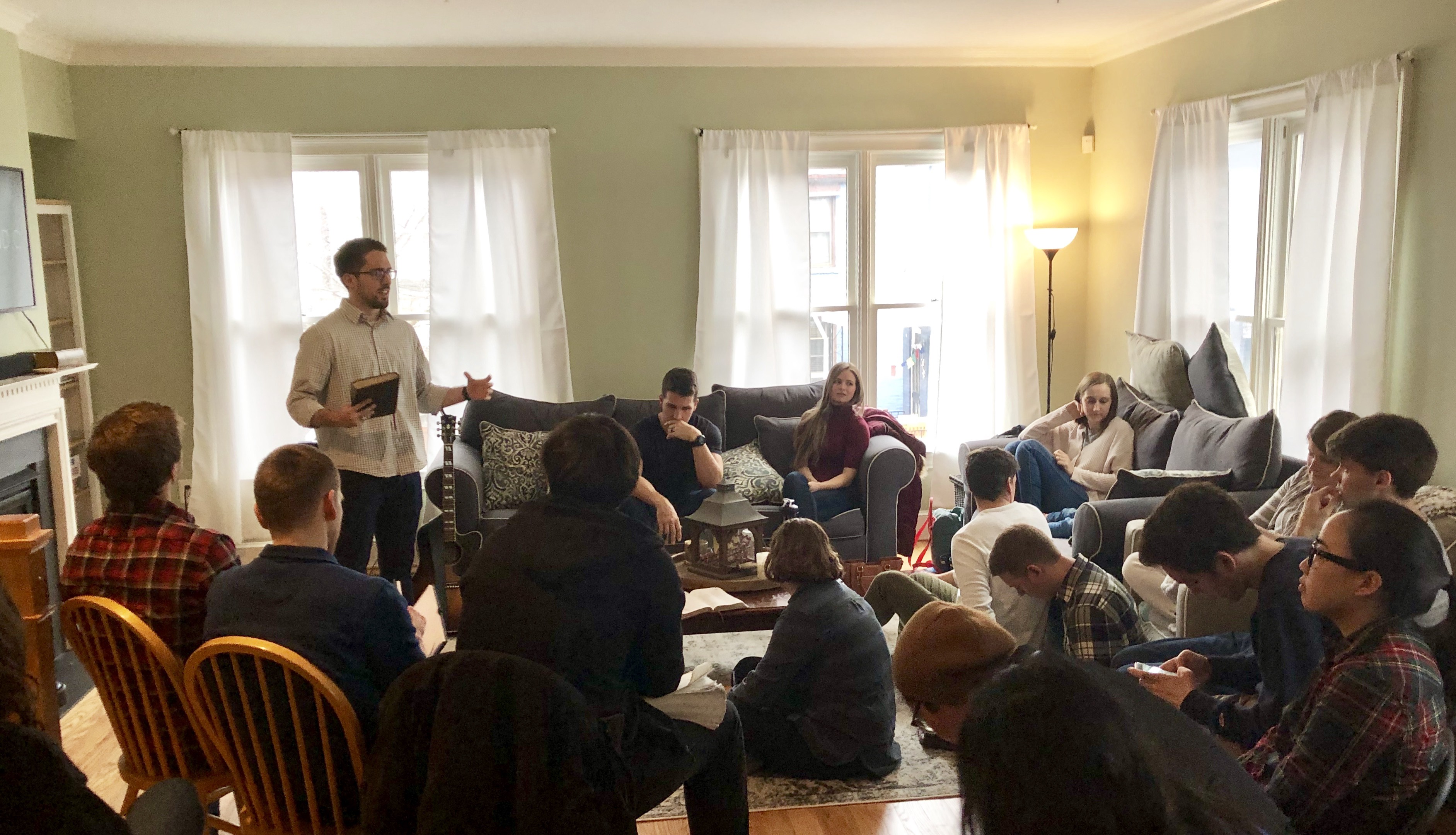
Stephen
Terry, Director

An Exciting Way to Get Involved
Commentary
for the September 5, 2020 Sabbath School Lesson
 "I served the Lord
with great humility and with tears and in the midst of severe testing by the
plots of my Jewish opponents. You know that I have not hesitated to preach
anything that would be helpful to you but have taught you publicly and from
house to house. I have declared to both Jews and Greeks that they must turn to
God in repentance and have faith in our Lord Jesus." Acts 20:19-21, NIV
"I served the Lord
with great humility and with tears and in the midst of severe testing by the
plots of my Jewish opponents. You know that I have not hesitated to preach
anything that would be helpful to you but have taught you publicly and from
house to house. I have declared to both Jews and Greeks that they must turn to
God in repentance and have faith in our Lord Jesus." Acts 20:19-21, NIV
Several decades ago,
as a teenager, I gave my heart to Christ. At that point, denominationalism
meant little to me. Like my young school friends, I attended the church that was
in my neighborhood, the church my nearby friends also went to. Church was more
about seeing my friends outside of school than about religion. As I have grown
older, I have found that for many, this is still true. People tend to go where
their friends go. When asked they may say they go because their denomination
teaches "the truth." But if put on the spot to explain those truths, many could
not. This can be a byproduct of attending church to listen to someone speak up
front at the pulpit with no opportunity for interaction. We get our weekly dose
of preaching and hope that will carry us through to the next one. Most denominations
have a pre-church school before the service where a more dialectic approach is
possible, but often a leader simply presents the denominational line and
questioning of dogma may be squelched either by the leader or by peer pressure.
Church can become more about moving everyone to denominational uniformity than
about personal exploration and growth. In such an environment, I doubt I would
have discovered a personal relationship with Christ. Fortunately, the ministry
of that denomination did not end at the church doors.
The church had a ministry
to the youth that met each week in a church members home. Although the
demographic was based on an age requirement, beyond that, it was a classic home
church. There was far more interaction between the leader and the attendees
than was present at church. And because the format was intended to reach the
lost, there was a lot more openness to questions and searching, at least at
first. In practice, I discovered that once a person accepted Christ the denomination
felt that was when such questioning and growth should stop and the new convert
should work hard at settling into the overall uniformity of the corporate
church. The result was that I left that denomination and began a life-long
search for the kind of atmosphere that I felt in that house church before I
gave my life to Christ, but with my relationship with Christ alive and growing
rather than stagnant and mired in unquestionable dogma.
As part of that search,
I have attended college and majored in both biblical languages and theology.
But far from causing me to "settle in." it opened ever more questions to my
mind as I began to understand the vastness and at times, incomprehensibility of
God. For instance, it staggers my mind that God, bigger than the universe,
could speak into that house church all those years ago and reveal himself to
me. I was raised in an alcoholic home. Although we were fed and clothed and had
more than some in other parts of the world had, our home life was not stable or
conducive to doing homework and getting somewhere in life. My father felt since
he had not been educated, it was not necessary for us either. He acted out this
belief by refusing to attend my college graduation. But when God spoke to my
heart that evening in the home we were meeting in, something changed about my
life. Where I had just been drifting with a lot of emotional pain, I found that
a door had opened in my mind to greater possibilities. This created added
tension at home as my father wanted nothing to do with religion. But where my
grades in school had been abysmal before, they began to improve. Faith and hope
in the future replaced the aimless ennui that was my existence before. It is
what drove me, not only to complete high school, but to graduate college as
well. It has been ironic, however, that the experience that encouraged me toward
those interactive experiences turned out to be unable to go beyond the didactic
to a more open faith reality. It has been as if allowing such questioning would
cause a person to revert to a pre-saved condition, even though that questioning
brought about my salvation in the first place.
More recently, about
ten years ago, my wife and I experimented with having a weekly home church
meeting, and the first meeting went well, but subsequent meetings became difficult
as some attending were not there to grow together but to interrupt and put down
anyone they felt was questioning denominational dogma. It became so ugly that
we had to stop the meetings for the emotional health of those being set upon.
We could have banned the offending members from the meetings, but the ones
creating the problem were wealthy, influential members in the church and they implied
they could begin a campaign with the church board against our meetings. Instead,
I moved to another church where members and visitors could ask their questions
and raise their challenges without being attacked. Disagreements still exist
within the group, but ad hominem attacks are not tolerated. That allows a more
open, sharing atmosphere as together we look for answers.
Many corporate churches
seem to have drifted away from the intimacy of home churches. There may be a
fear of exactly what we experienced, an inability to grant validity to everyone's
search on the part of the church leaders. This may also be why so few attend
church more than once per week, if that often. It is difficult for them to support
that posture of consistent uniformity beyond that limited exposure. But that may
be indicative of the real problem. We are trying to force ourselves into
perfect obedience, even when we know that is not our experience. We all
struggle with flaws of character and the poor choices we sometimes make. Should
we then, under the mantle of denominational imprimatur, pretend this is not so?
At church, where interaction is limited by the nature of the service, we might
believe this to be true. But in the intimacy of home church, this is much
harder to pull off. Typically, the people who come know us; they know we are not
perfect. That can set them at ease in their own imperfection. Home church then can
find power in our shared imperfections and the shared grace that can spring
from that realization.
When we attend institutional church, the implied message is that the speaker,
raised above the congregation and didactic rather than being a channel for
two-way communication, is closer to God than the congregation, and therefore
able to lecture the congregation as a right of office. The result can be a
temptation to include ideas more like
Johnathan Edwards' 1741 sermon, "Sinners in the Hands of an Angry God" by an ecclesiastic
looking down on the members in the pews set out on a lower level than his august
person. That some pastors can resist this temptation is commendable, but too
many succumb. Even as students preparing for the ministry this trait can raise
its head. A fellow student when I was attending college went about offering to
pray for people, telling them that a theology student's prayer was worth more
than the average person's. That student entered the ministry and enjoyed a long
career with the denomination despite such a belief. Hopefully, his attitude moderated
over time.
The early church experienced
similar tension between the institutional religion of the Jewish people and the
upstart Jesus sect that arose in the first century. Due to the opposition of the
official religious leaders, the people met in their homes and shared their experiences
and their meals, supporting one another materially as needed.[i] Our recent experiences with
the pandemic and subsequent lockdown has brought many to the point of
questioning whether we have departed from the early church model in favor of
centering our faith on the idea of large buildings filled with hundreds of
people as the proper model for ministry. We have all wondered in view of apocalyptic
persecutions foretold by several denominations how church would organize itself
under those pressures. This lockdown may be an opportunity to explore that.
Should we rethink church or return to church as usual as soon as possible? The
temptation to keep things as they have gone for centuries can be extraordinarily
strong, even when it can be proven to be dysfunctional.
While I was attending
college, all those many years ago, I had the opportunity to study the Bible
with a man and his wife who were searching for some answers from the Bible. I
shared with them what I had discovered. They pondered what I had shared and
then said that it was obvious what the truth was on the issue. They thanked me
for helping them to see it. I then asked them what they planned to do with this
truth. The husband replied, "Nothing." A little surprised, I asked why they sought
the answer if they were going to do nothing? He said they had been doing things
differently for so long, it made no sense to change. Maybe he summed it up for
many of the rest of us as well.
